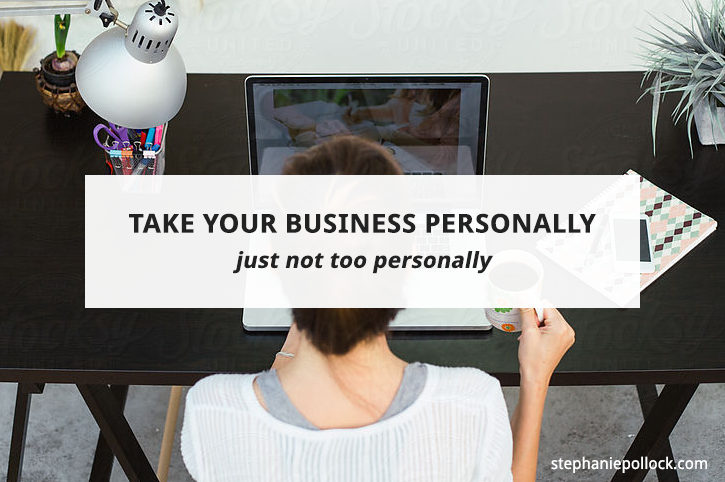If you’re like most business owners I talk to, your business likely feels like an extension of yourself — like it’s a part of who you are.
It eats up a lot of your brain power and you probably find it hard to turn off. I bet that you’re thinking, scheming, planning and processing even while you’re making dinner, playing with your kids or walking your dogs.
(or is that just me?!?)
As small business owners, we care deeply about our work and the impact it’s having in the world, alongside how it’s feeding us, both emotionally and financially. Our business matters and we take it seriously AND personally.
And that’s the way it should be if you want to build a business that endures.
As Starbucks CEO, Howard Schultz said about business:
“You can’t build something unless you take it personally.”
You already know this, I’m sure. You care about your business deeply, and you are heavily invested in its success.
But here’s where it can get a little messy – particularly if you’re a one-person shop.
While you must take your business personally, you must also separate yourself from the business.
Because you are not your business. And your business is not you.
This is a critical distinction that most small business owners miss and one that leads to massive frustration, self-doubt, fear and playing small. It’s normal and natural that this happens, because as micro-business owners, we’re likely doing 85% or more of the tasks inside the business — it’s no wonder it feels like an extension of us.
This is where you need to flex your leadership muscles.
When you’re truly leading your business, you understand that while your business should reflect and be aligned with your values, your strengths, and your unique contribution — it is a separate living, breathing form from you. It lives independently of you. It is NOT you.
Yes, you need to feed it, care for it and nurture it for it to survive (at least until you can hire others to do this, or you create more scalability in your business model – a topic for a different conversation). You are the engine that keeps it running.
But it’s not you.
Why is this even important, you may wonder?
When we intertwine our business with ourselves too deeply, we run the risk of attributing any mistake, failure or hiccup with our own sense of self-worth.
It becomes about us, not the business. We messed up. We don’t know what we’re doing. We are never going to be successful. And down the rabbit hole of doubt we go, tearing off chunks of our self-confidence and worth as we tumble down further.
Take, for example, the commonly heard business phrase of, “You’ve got to charge what you’re worth.”
What a loaded statement! How do you put a price tag on your personal worth? And yet, that’s what the statement is suggesting.
A few weeks ago, I was on a coaching call with a client who was in the process of raising her rates. She felt like she was undervaluing herself, and that by extension, her clients weren’t really rising to the level they could or respecting her work. And so she wanted to raise her prices but felt guilty, nervous and scared about making the change.
I invited her to reframe the way she was looking at it.
“Be mindful of the language you’re using to talk about this. While it may appear like semantics, it’s risky business because you’ve essentially created a dynamic where your pricing is in direct correlation with your worth as a person. While you are the conduit through which your services get delivered through your business (in this case, coaching), you are NOT your business. Your BUSINESS provides this value. Your business creates transformation in people’s lives. The value and worth are about your business – not you.”
She took a deep breath and said, “That changes everything.”
This is one of many examples of what happens when there’s no division between you and your business (yes, EVEN if you brand as yourself like I do).
Other examples include:
- Hiding out from expressing your true point of view for fear of personal rejection
- Making business decisions purely from emotions (e.g. you have a bad day and so you let that influence a key decision)
- Saying yes when you should say no because you’re worried about offending someone (instead of what the best BUSINESS decision would be)
- Being unwilling to delegate or employ scale strategies requiring someone other than you to do the work
- Assigning personal blame to projects that don’t fly, rather than deconstructing them to identify improvement areas
When you embrace your leadership role in your business, you make business decisions, not personal ones. YES, of course, your business decisions must always reflect and consider what’s important to you personally (again, this is about alignment), but you never neglect what’s in the best interest of the business because you’re all caught up in your own inner and personal monolog about it.
This distinction DOES change everything – your confidence will grow, your ability to make smart business decisions will grow and naturally so to will your client base, your visibility and your profits.



